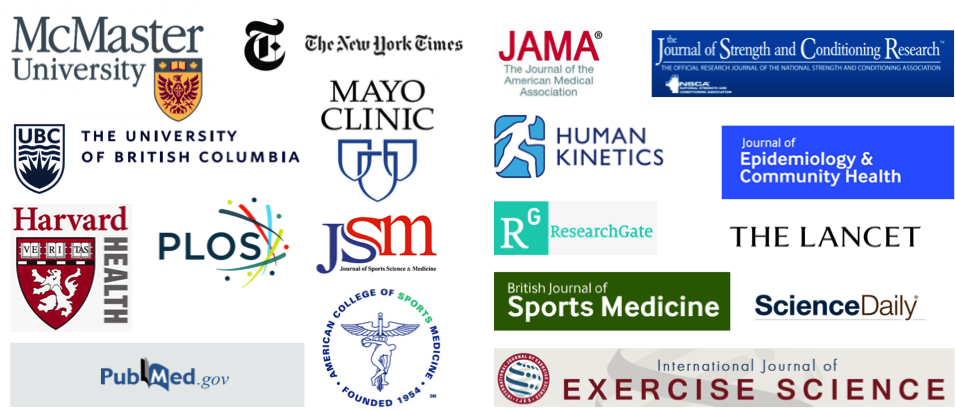|
Evidence-based Benefits of Strength Training The benefits of strength training are well known. That’s why it is recommended by health and fitness authorities across the world. Health Canada recommends that both younger (16-64 years) and older (65+ years) adults should engage in muscle and bone strengthening activities 2 days per week. The benefits of strength training have been proven for many years and continue to be the subject of rigorous research undertaken by respected institutions and then reported by authoritative sources, including, among others:
Here are some evidence-based conclusions about strength training for a range of life-enhancing benefits. (Click on the link to access the research study.) 1. Increased Strength (in little time) “Marked increases in strength and endurance can be attained by resistance-trained individuals with just three 13-min weekly sessions over an 8-wk period, and these gains are similar to that achieved with a substantially greater time commitment.” Medicine & Science in Sports & Exercise 2. Stronger bones “Of the several exercise training programs, resistance exercise (RE) is known to be highly beneficial for the preservation of bone and muscle mass.” Journal of Endocrinology & Metabolism 3. Weight control “Among nearly 1.7 million US adults, meeting both aerobic and muscle-strengthening exercise guidelines was associated with a lower obesity prevalence, and associations were more pronounced for higher obesity classes.” Obesity 4. Lower blood pressure “Endurance, dynamic resistance, and isometric resistance training lower SBP [systolic blood pressure] and DBP [diastolic blood pressure], whereas combined training lowers only DBP. Data from a small number of isometric resistance training studies suggest this form of training has the potential for the largest reductions in SBP.” Journal of the American Heart Association 5. Decreased risk of diabetes “These data support the inclusion of muscle-strengthening exercises in physical activity regimens for reduced risk of type 2 diabetes and cardiovascular disease, independent of aerobic exercise.” Medicine & Science in Sports & Exercise
6.Reduced depression / Improved Memory
“Resistance exercise training (RET) significantly reduced depressive symptoms among adults regardless of health status, total prescribed volume of RET, or significant improvements in strength.” JAMA Psychiatry 7. Reduced Anxiety “Guidelines-based RET [resistance exercise training] significantly improved anxiety symptoms among young adults.” Nature 8. Improved metabolism “Individuals with a higher baseline in systolic blood pressure…derived greatest benefit from the resistance training intervention, regardless of how many times-a-week they trained [with] no evidence that higher training frequency would induce greater benefit regarding inflammation markers or glycemic profile in healthy older adults.” Frontiers in Physiology 9. Breast cancer survivor rehabilitation “We conclude that a supervised, high-intensity strength training program seems to be an effective means to improve muscle strength, cardiopulmonary function, and HRQOL [health-related quality of life] and should be incorporated in cancer rehabilitation programs.” Acta Oncologica 10. Reversal / reduction of sarcopenia for a longer, more active life “Progressive strength training in the elderly is efficient, even with higher intensities, to reduce sarcopenia [progressive skeletal muscle and strength loss], and to retain motor function.” Scandinavian Journal of Medicine & Science in Sports
0 Comments
Leave a Reply. |
AuthorRandall Lightbown is the founder, head coach and face of S+.
A certified strength training specialist, nutrition coach, martial arts adept and certified masso-kinesitherapist, Randall combines his expertise in the movement arts with a deep understanding of the human body. He dedicates his life to helping people of all ages achieve health and wellness and realize their greatest potential for healthy living, satisfaction and personal fulfillment. Archives
August 2021
Categories
All
To know more... and find out how to get a free introductory session...
|
PARTNERS WITH:
Contact us
In the Espace Santé IDS - Centre de santé Bien-Être
8 Place du Commerce - Ground floor
Nuns' Island, QC
H3E 1N3
Tel: 514-769-1010
8 Place du Commerce - Ground floor
Nuns' Island, QC
H3E 1N3
Tel: 514-769-1010
Copyright © 2021 S+ - All rights reserved




